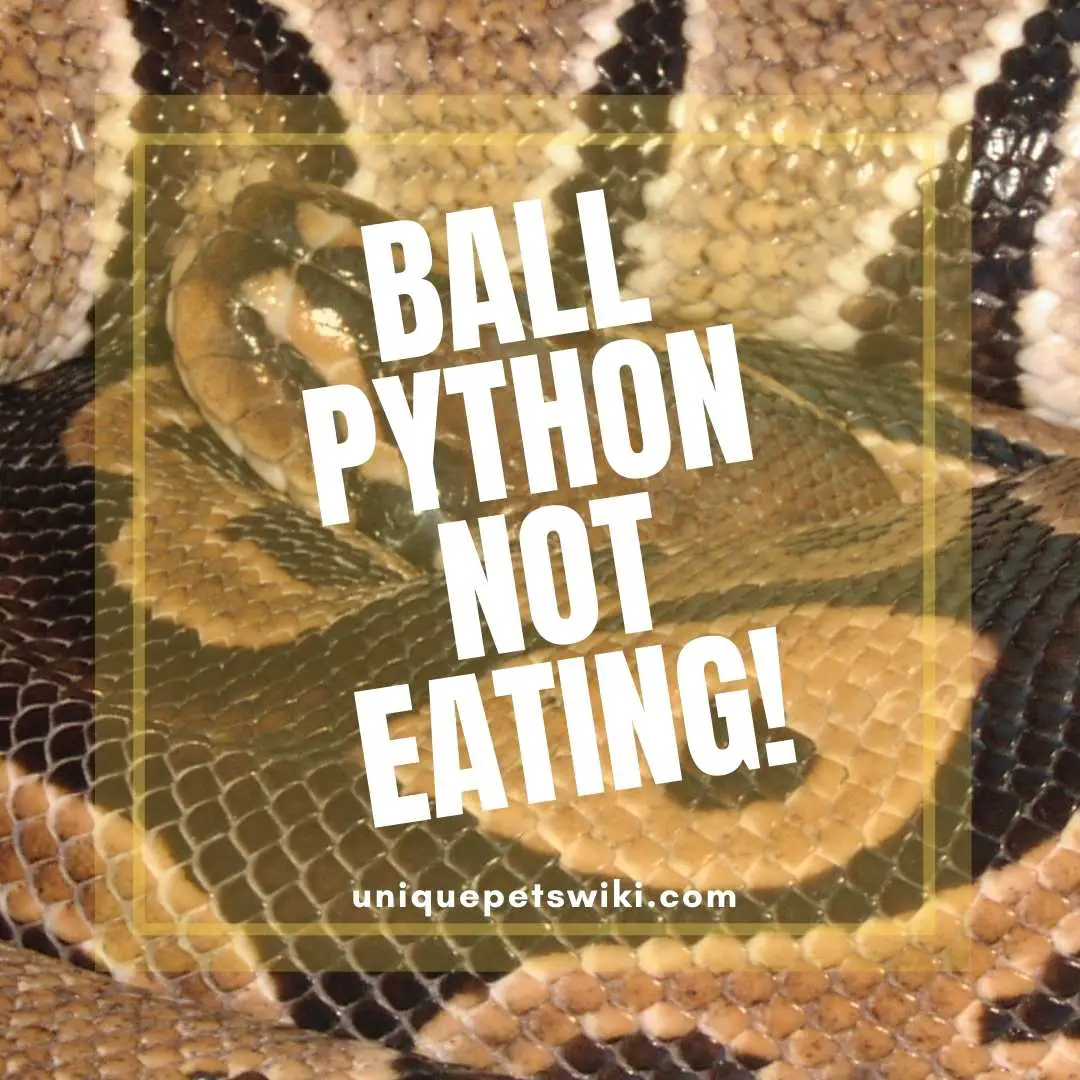Getting your fussy or picky ball pythons to eat whether live prey or frozen-thawed prey can be a bit of trouble. It will take a lot of experimentation and guesswork. We will discuss more about why does ball python not eating.
Since these species of snakes are not good or heavy eaters like other reptile animals, you need to understand how to feed them in captivity for them to stay in health. The reason your pet ball python is not eating is as a result of some factors which will be discussed in this article.
At the end of this article, you should be a great keeper in regards to feeding your pet ball pythons.
This article has been reviewed by Dr. Gospel. Read more about our knowledge control process here.
Contents
Why Is My Ball Python Not Eating?
For various reasons such as stress, illness, transitioning, seasonal fasting, shedding, poor husbandry and poor habitat setup, captive ball pythons will refuse to eat until the factor responsible for its loss of appetite is addressed. While some of these causes listed above are normal, which means that ball pythons can go a long time without food, some are not.
However, since ball pythons are nocturnal animals, meaning that they are mostly active during the night, try feeding your non-snake at night to see if it’ll eat.
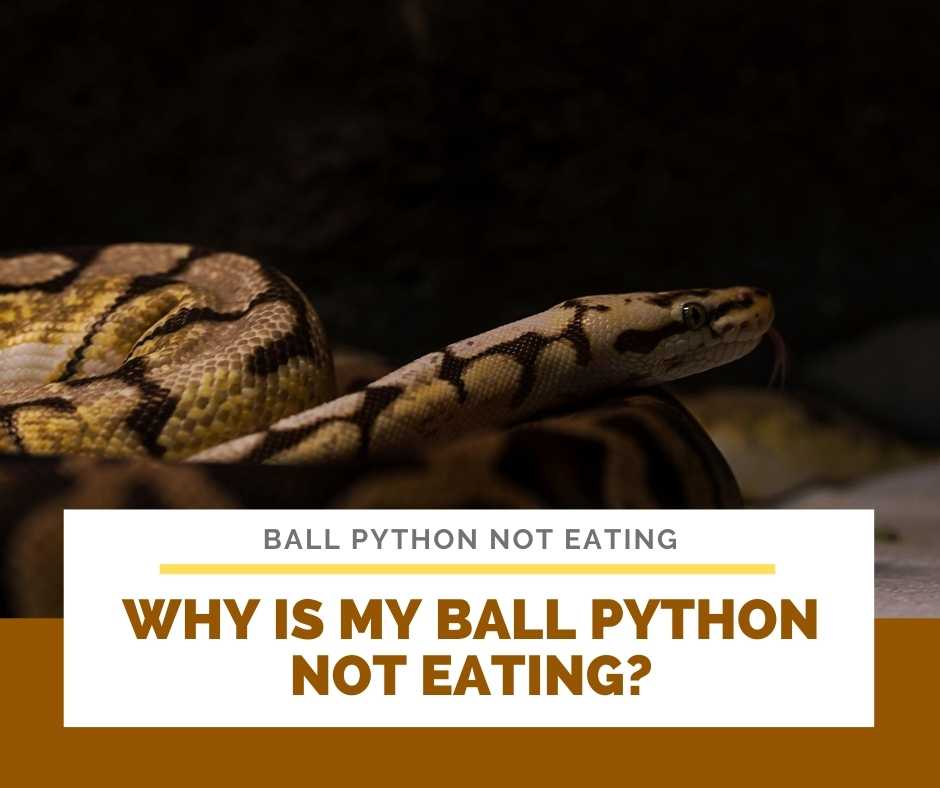
Loss of appetite in ball pythons is one of the major symptoms of poor health or poor husbandry. Whatever is the cause, it shouldn’t be taken lightly. Most of the time, transitioning is the reason captive ball pythons will refuse to eat.
This has to do with growing from one stage of life or age to another. This also usually involves feeding them with a different type and size of prey.
Dealing with stage transitioning often takes lots of trials and guesswork to finally know what prey your pet snake prefers.
Other than not eating because of transitioning in ball pythons, several other factors are causing ball pythons in captivity not eating at all or refusing to eat:
- Stress
- Poor Husbandry Or Improper Cage Setup
- Snake About To Shed
- Seasonal Fasting
- Picky Eater
- Poor Health
Let’s explain them in detail:
Stress
What can constitute stress to ball pythons are excessive handling, poor husbandry, or improper cage set up. This factor oftentimes is the major reason captive ball pythons will refuse to eat.
Poor Husbandry Or Improper Cage Setup
For any level of herpetologist, the most important things you must ensure you provide your pet animals are the right environmental conditions and care. If you miss anything in giving the right habitat and care, your pet animal is going to suffer for it and the resultant effect is loss of appetite.
Ball pythons are nocturnal reptiles, they need a warm and dark environment to thrive. In the wild, what they do is hide in burrows during the day and come out for hunting during the night.
That being said, your captive ball pythons should be given food during the night. Note that the golden rule of keeping wild species of animals as pets is to provide an environment or habitat that simulates their natural habitat.
Therefore, an inappropriate temperature gradient and size of the enclosure to allow room for stretching, climbing, hiding, and burrowing will cause stress to your pet ball pythons.
In a nutshell, a HEALTHY ball python kept under the RIGHT CONDITIONS, and PROPER HUSBANDRY will not refuse food. However, should that happen, he will in the end eat subsequent meals that are given provided he is healthy.
Snake About To Shed
Adult ball pythons shed often, about once in two months. During this period, they will refuse food until when they are done shedding. Signs that they are shedding include milky-looking eyes and pale-looking scales.
If your snake is in this condition just leave it alone. But if your snake has some difficulty shedding, you can bathe your buddy in soapy lukewarm water or use a shedding agent like Zoo Med Repti-Shedding Agent to ease the process.
Seasonal Fasting
There are about three seasons in the life cycle of ball pythons that will make them go for weeks or months without food. One of such seasons is the brumation or hibernation period.
This usually occurs in the winter months of June to August or December to March. Even in captivity, they all have this survival instinct that signals them when that time of the year approaches.
They will practically go for months without food and during this period, they will appear inactive, burrow or hide most of the time. Another season in the life of ball pythons that they will refuse to eat is once they attain sexual maturity.
This normally takes place when they are about two years of age. It is normal for male ball pythons to refuse food once they start chasing ovulating females.
Gravid and ovulating females will also refuse to eat. Because of these seasonal changes, many pet ball pythons will only eat for a few months in a whole year. As a breeder, there’s nothing to worry about during these periods. These seasons are normal.
Picky Eater
The problem of a ball python being picky about its food is associated with transitioning from one stage of life to another. If they are used to a particular type of prey, they may become fussy about eating the new prey you are offering.
For instance, if your snake is used to eating pre-killed rats or live mice, try getting it to eat live rats or frozen-thawed rats and monitor which type of prey it prefers.
Poor Health
Poor health is another major reason for loss of appetite in captive ball pythons. Ball pythons suffering from internal parasites, respiratory infection, or retained shed will refuse to eat until the health issues are treated.
To rule out the fact that your snake is not eating because of poor health will require a thorough examination by a certified vet.
Oftentimes, loss of appetite as a result of illness is always accompanied by any of these symptoms such as pale-looking scales, wheezing sounds while breathing, discharge from the mouth and nose or diarrhea.
Best Ways To Get A Finicky Ball Python To Eat Frozen-Thawed Prey
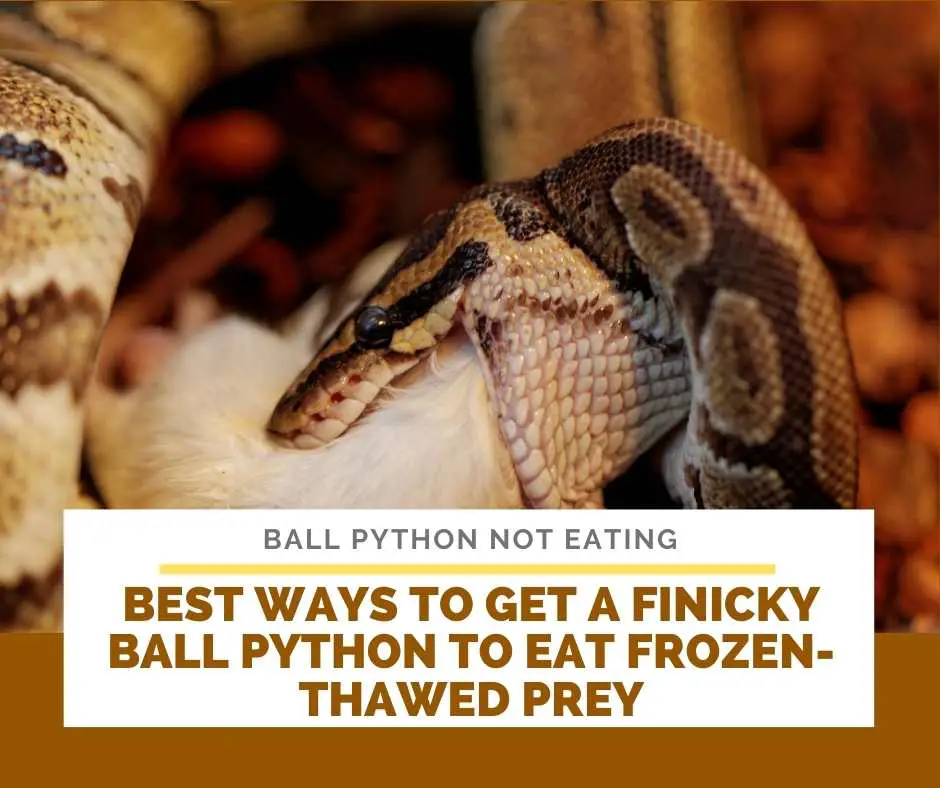
Feeding your pet ball pythons frozen-thawed prey is by far the safest way of feeding them in captivity. It reduces the risk of harm and stress to you, your snake, and the prey.
Like providing the right heating and lighting, offering a frozen-thawed rodent has procedures you would have to learn of. Once your frozen-thawed prey is ready, proceed to feed your snake via these steps:
Heat Up Or Warm The Prey
The first thing you must do to your frozen-thawed rodent is to pre-warm it to at least above room temperature. In the wild, ball pythons hunt for warm-blooded animals. They can detect the body temperature (heat) of their prey from a distance.
So offering them cold food, rodents that are at room temperature or a ‘just-thawed’ rodent is against what they have in the wild. Since it is detrimental to their health to eat cold food, they will outrightly reject it.
Feed At Night
Ball pythons are nocturnal reptiles and in the wild, they go hunting for prey at night. Therefore, the best time to offer food to your pet python is at night or towards the evening when the enclosure is dark.
Although in captivity, ball pythons are sensitive to time. They will instinctively tell when it is not yet night time. Should you want to offer your snake food during the day, make sure that the enclosure is as dark as the night. To achieve this, ensure you keep down the shades and dim the lights.
Change Prey Type, Size, Or Color
If your snake is still not eating whatever rodent you present, try another type of prey or a different size prey. Also, try a different color prey to experiment if your snake will like it.
In the wild, ball pythons aren’t used to white rodents so they may refuse it in captivity. Braining and scenting the prey with something desirable or familiar to your snake can also stimulate it to eat.
Provide More Security And Eliminate Stress
Prior to the time you want to feed your snake, reduce the rate at which you handle it. This is to avoid stressing your snake. By providing enough space and materials for stretching, climbing, hiding, and burrowing; will also ensure security.
When they feel safe and secure, they will be happy, less stressed, and will likely eat. In situations your snake still refuses food when all conditions are kept appropriate, give it enough time to relax before another attempt.
How Long Can A Ball Python Go Without Food?
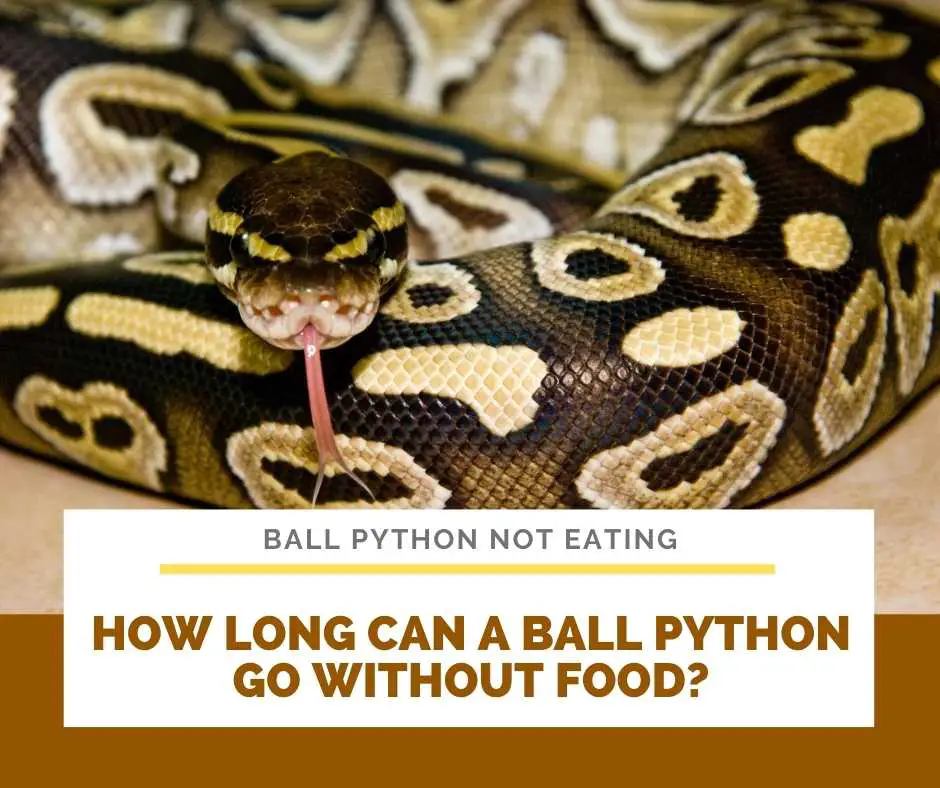
As earlier stated, poor health and poor husbandry are the major reasons for loss of appetite in captive ball pythons.
So when these two possible factors are ruled out, a healthy ball python in captivity can go as long as 6 months without food. And in some cases even up to a year or more without food.
Conclusion
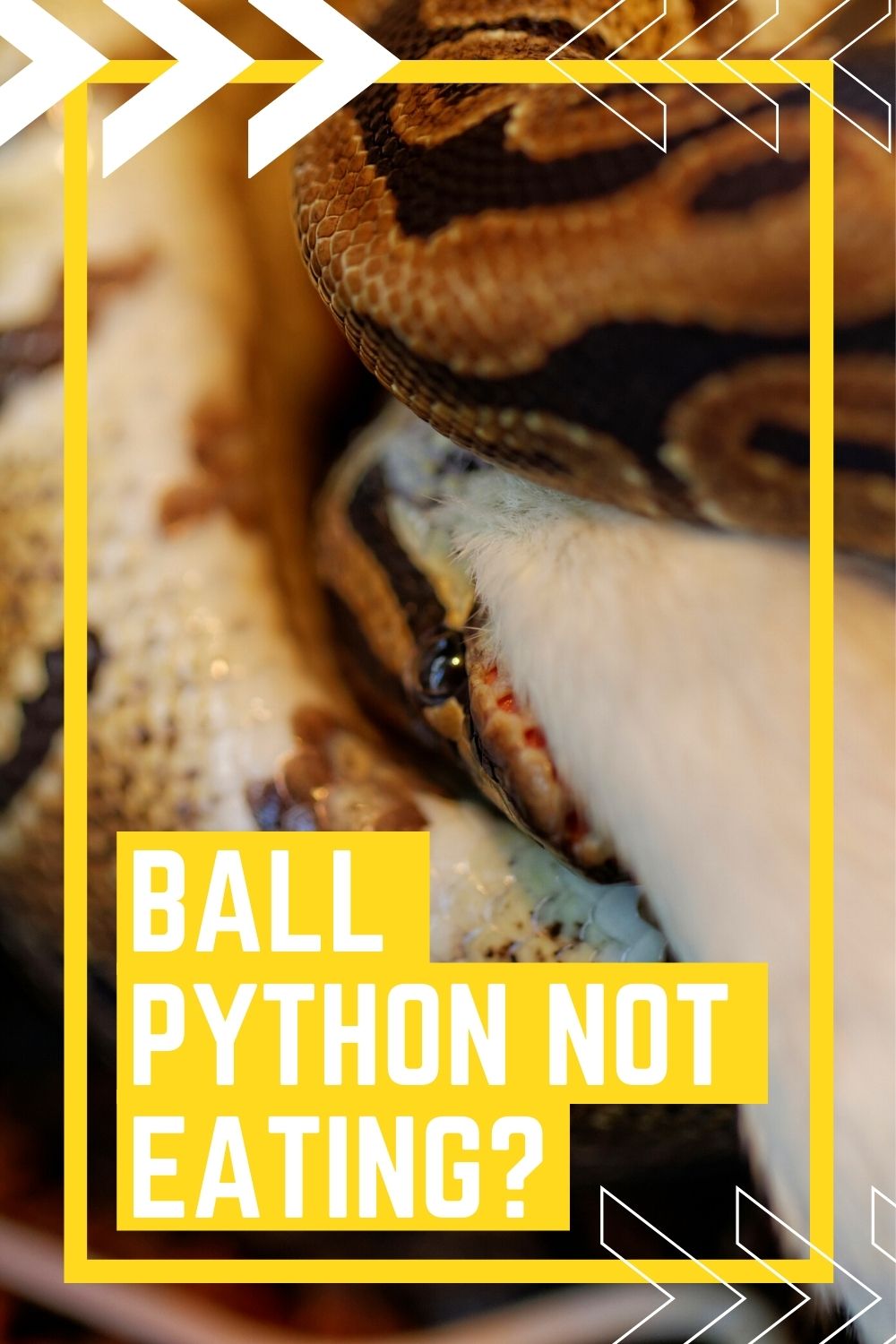
From our discourse in this article, you can realize that ball pythons are routine animals that do not like changes that much. These changes in their husbandry or cage setup constitute stress factors to them.
